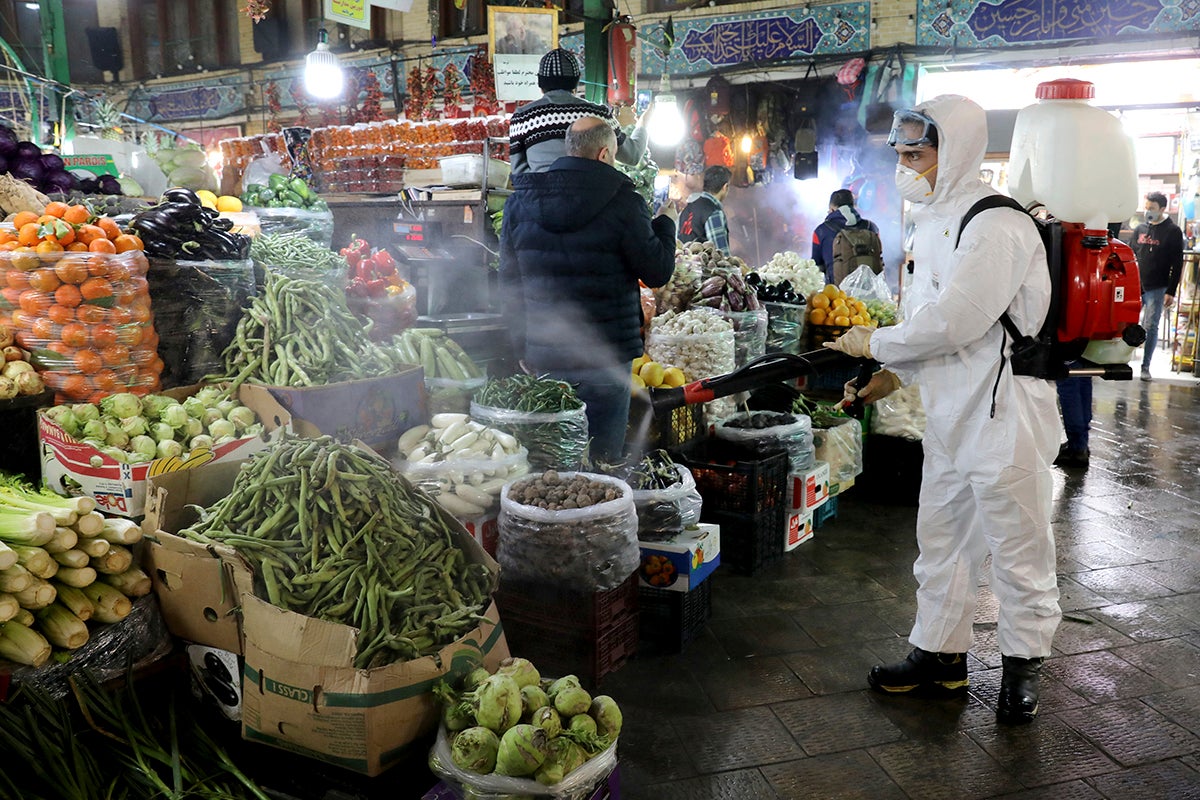Iran: Free Wrongfully Detained Prisoners - 5 minutes read
 Expand Paramedics work in a laboratory that tests samples taken from patients suspected of being infected with the new coronavirus, in the southwestern city of Ahvaz, Iran, March, 10, 2020. © 2020 AP (Beirut) – Iran’s prison authorities should facilitate temporary release of all eligible prisoners and the unconditional release of people detained for peaceful dissent, due to the coronavirus (COVID-19) outbreak, Human Rights watch said today.
Expand Paramedics work in a laboratory that tests samples taken from patients suspected of being infected with the new coronavirus, in the southwestern city of Ahvaz, Iran, March, 10, 2020. © 2020 AP (Beirut) – Iran’s prison authorities should facilitate temporary release of all eligible prisoners and the unconditional release of people detained for peaceful dissent, due to the coronavirus (COVID-19) outbreak, Human Rights watch said today.The virus has spread across Iran, and poses a heightened risk in closed institutions. To reduce the risk of further transmission and mortality, authorities should also support “social distancing” measures in the community and ensure that all remaining detainees have access to adequate medical care.
“The threat of the coronavirus epidemic increases the risk to their health and safety for political prisoners, who should never have been imprisoned in the first place,” said Michael Page, deputy Middle East director at Human Rights Watch. “Judicial authorities should not waste any time in releasing scores of wrongfully detained prisoners who are still behind bars and granting temporary release to other eligible prisoners.”
Iran is experiencing one of the fastest outbreaks of coronavirus infections outside China, with several reported cases across the country of detainees showing symptoms. The Iranian judiciary news agency, Mizan, announced that the judiciary chief has ordered the temporary release of 70,000 prisoners for the upcoming Persian New Year (Nowruz), which begins on March 20, 2020. Yet dozens of human rights defenders and others sentenced on vaguely defined national security crimes remain in prison. Their families have said they are concerned about the health and safety of their loved ones in detention.
Human Rights Watch has received reports that prisoners have tested positive for coronavirus, including in Evin prison in Tehran and in the cities of Euromieh and Rasht. On February 27, in an open letter, families of 25 prisoners detained for their activism pleaded with judicial officials to release or at least grant temporary release to their loved ones amid the coronavirus outbreak and the lack of sufficient medical care in prisons.
On March 2, Jared Genser, an American lawyer who represents the family of Siamak Namazi, an Iranian-American businessman sentenced to 10 years in prison in an unfair trial, said in a statement that “a prisoner in Siamak’s ward, who slept just several cells down the same hallway, had acute respiratory symptoms, tested positive for coronavirus, and has now been taken to ‘quarantine.’”
On February 29, the family of Nazanin Zaghari-Ratcliffe, a British-Iranian charity worker who has been sentenced to five years in an unfair trial, said that she was experiencing symptoms of COVID-19 and believe “she has contracted coronavirus inside Evin Prison.” On March 8, the family said that she still has not been tested for the virus, but that her symptoms and general health are improving. On March 11, colleagues of Fariba Adelkhah and Roland Marchal, two professors of the Sciences Po who have been detained in Iran since June, also asked the Iranian Supreme Leader to release them on “humanitarian grounds” because of their health concerns amid the outbreak.
On March 4, families of eight conservationists who have been detained for over two years and have been sentenced on bogus espionage charges wrote an open letter, reiterating their plea to the head of the judiciary to allow for temporary release of their loved ones.
Over the past several days, the authorities have temporarily released a number of activists and journalists including Neda Naji, Shahnaz Akmali, Masoud Kazemi, Abdolreza Kouhpayeh, and Mahmoud Beheshti Langroudi. On March 9, Mostafa Turk Hamedani, the lawyer for Hengameh Shahidi, a journalist who is currently serving a seven-and-a-half-year prison sentence, tweeted that the authorities granted his client temporary release until April 5 on suspicion that he had contracted the virus.
Families of several other prominent human rights defenders including Narges Mohammadi, Nasrin Sotoudeh, and Atena Daemi have said they are concerned about the safety of their loved ones in detention. On March 6, Taghi Rahmani, a political activist and the husband of Mohammadi, who suffers from rare neurological disease, tweeted that a prosecutor in the city of Zanjan, where Mohmmadi was transferred recently, had refused to grant Mohammadi a temporary release.
The father of Atena Daemi, a human rights defender who has been in prison since 2016, told Human Rights Watch that his daughter has a weak immune system and he is worried that “if she contracts the virus, she will suffer very serious harm.” He said that he the authorities have not agreed to release her temporarily.
An informed source told Human Rights Watch that the authorities have also not agreed to grant temporary release to Arash Sadeghi, a human rights defender who is detained in Rajai Shahr prison and has suffered from multiple health problems, including cancer. The source said that, even though bail had been posted for her, the authorities have also refused to temporarily release Golrokh Iraee, Sadeghi’s wife.
Under international law, prison authorities are obliged to ensure necessary hygiene to prevent disease transmission and essential medical care for all detainees. In cases in which prisoners are suspected of having contagious diseases, states are obligated to provide for their clinical isolation and appropriate treatment.
“Controlling the coronavirus spread in Iran will require preventing transmission in Iran’s notoriously overcrowded prisons,” Page said. “The government should act immediately to release eligible prisoners and ensure that proper hygiene and care are provided for those who remain.”
Source: Hrw.org
Powered by NewsAPI.org